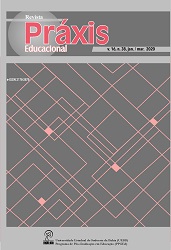LAS STUDENT CONCEPTIONS ON JUSTIFICATIONS AND PROOFS IN A MATHEMATICS TEACHING DEGREE PROGRAM
DOI:
https://doi.org/10.22481/praxisedu.v16i38.6016Keywords:
Initial Education for Mathematics Teachers, Conceptions regarding for teaching of proofs, Concept ImageAbstract
The purpose of this article is to discuss the conceptions and the concept image of future teachers regarding justifications and proofs for teaching and learning mathematics. This study is qualitative in nature and involved a group of ten students in the Mathematics Teaching Degree program on a campus at the Federal University of Sergipe. To collect the data presented here, we applied a questionnaire and carried out interviews. The data analysis was based on the studies of Tall and Vinner, who discuss the notion of Concept Image, and that of Ponte, relative to the idea of Conception. The results showed that there does not seem to be a consensus on the inclusion of proofs in the curricula of Basic Education, because, in general, the group of students considers the topic relevant, but, since they assume the meaning of a proof is a formal and rigorous demonstration, they argued that teaching it would be for a restricted group of students. These conceptions were the starting point for the training process developed soon after this study.
Downloads
Metrics
References
BOGDAN, Robert C.; BIKLEN, Sari Knopp. Investigação qualitativa em educação. Uma introdução à teoria e aos métodos. Porto: Porto Editora, 1999.
BRASIL. Secretaria de Educação Fundamental. Parâmetros Curriculares Nacionais (5ª a 8ª séries). Brasília: MEC, 1998.
BRASIL. Ministério da Educação. Base Nacional Comum Curricular - Educação é a Base: Ensino Fundamental. Brasília: MEC. 2018.
CAMPOS. Tânia Maria Mendonça; PIETROPAOLO, Ruy César. Um estudo sobre os conhecimentos necessários ao professor para ensinar noções concernentes à probabilidade nos anos iniciais. In: Processos de ensino e aprendizagem em educação matemática. v. 1. Recife: Ed. Universitária da UFPE, p. 55 91, 2013.
GARNICA, Antonio Vicente Marafioti. Fascínio da Técnica, Declínio da Crítica: um estudo sobre a prova rigorosa na Formação do professor de Matemática. Zetetiké, CEMPEM-UNICAMP-Campinas, v.4, n.5, p.7 - 28, 1996.
GARNICA, Antonio Vicente Marafioti. As Demonstrações em Educação Matemática: um ensaio. Bolema, Rio Claro – SP, vol. 15, n. 18, p. 1 – 9, 2002.
HANNA, Gila. Challenges to the importance of proof. In: For the learning of Mathematics, v. 15, n.3, p. 42-49, 1995.
HANNA, Gila. Some pedagogical aspects of proof. In: Interchange, n. 21(1), p. 6 13, 1990.
HEALY, L.; HOYLES, C. A study of proof conceptions in algebra. In: Journal for Research in Mathematics Education, n. 31(4), p. 396-428, 2000.
PIETROPAOLO. Ruy César. (Re)Significar a demonstração nos currículos da educação básica e da formação de professores de matemática. 249f. Tese (Doutorado em Educação Matemática) – Pontifícia Universidade Católica, São Paulo, 2005.
PONTE, João Pedro. Concepções dos professores de Matemática e processos de formação. In: BROWN, M. et al. (Org.). Educação Matemática. Portugal: Instituto de Inovação Educacional, 1992. P. 185-247. (Coleção Temas de Investigação).
POWELL, Arthur B.; BORGE, Inger Christin; FLORITI, Gema Inés.; KONDRATIEVA, Margo; KOUBLANOVA, Elena & SUKTHANKAR, Nella. Challenging Tasks and Mathematics Learning. In: BARBEAU, E. J. & TAYLOR, P. J. (Eds.), Challenging mathematics in and beyond the classroom: The 16th ICMI study (pp. 133-170). New York: Springer, 2009.
TALL, David. & VINNER, Shlomo. Concept image and concept definition in mathematics with particular reference to limits and continuity. Educational Studies in Mathematics, 12, 151-169, 1981.
ZEICHNER, Kenneth M. Formando professores reflexivos para a educação centrada no aluno: possibilidades e contradições. In: Barbosa, R. L. L. (Org.) Formação de educadores: desafios e perspectivas. São Paulo: UNESP, 35-55, 2003.
Downloads
Published
How to Cite
Issue
Section
License
You are free to:
Share - copy and redistribute the material in any medium or format; Adapt - remix, transform, and build from the material for any purpose, even commercially. This license is acceptable for Free Cultural Works. The licensor cannot revoke these freedoms as long as you follow the terms of the license.
Under the following terms:
Attribution - You must appropriately give credit, provide a link to the license, and indicate if any changes have been made. You may do so in any reasonable way, but not in a way that suggests that you or your use is endorsed by the licensor.
There are no additional restrictions - You cannot apply legal terms or technological measures that legally restrict others to make any use permitted by the license.










